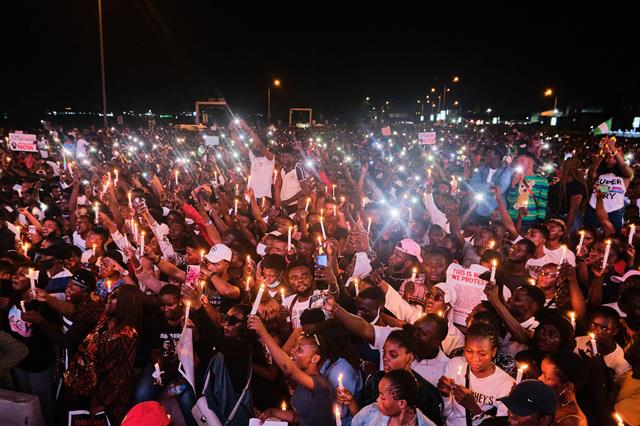 October 2020: Protesters hold candlelight for victims of police brutality during protests tagged #EndSARS in Lagos Nigeria. [photo: Adeyinka Yusuf / Alamy]
October 2020: Protesters hold candlelight for victims of police brutality during protests tagged #EndSARS in Lagos Nigeria. [photo: Adeyinka Yusuf / Alamy]
[This is an excerpt from an article in The Round Table: The Commonwealth Journal of Intrernational Affairs. Opinions expressed do not reflect the views of the Round Table editorial board.]
Youth leaders and celebrities formed an army of political supporters nearly two years after the #EndSARS march against Nigerian police brutality. Famous #EndSARS activists encouraged youth to vote. They dominated social media and were trending different hashtags daily. They addressed fuel and currency scarcity, insecurity, corruption, citizens’ dissatisfaction, and the Academic Staff Union of Universities’ (ASUU) eight-month strike with their numbers.
Many voters were ethnically and religiously motivated. A Christian candidate rose from the south-east Nigerian Igbo tribe for the first time. Since 1999, the region has not produced a president. To succeed, his tribesmen rallied him. Muslims’ All Progressive Congress (APC) tickets angered Christian authorities, and many Christians swore to oppose the party’s candidate. The ruling class was equally trying to get the South West candidate to lose, but his tribesmen supported him to ensure the region produced the president. Muslims worked and mobilised for Muslim-Muslim ticket admittance. The North had two strong candidates who also had substantial regional backing on both fronts.
Do social media matter? Examining social media use and youths’ political participation during the 2019 Nigerian general elections
Commonwealth election observation and Nigeria: a study of the 2015 and 2019 elections
The significance of the principle of ‘one person, one vote’ in safeguarding the credibility of an election cannot be overstated. The issue of individuals lacking fingerprints or possessing an insufficient number of fingerprints has prompted concerns by the Independent National Electoral Commission (INEC). This is the bane of the continuous usage of the existing Smart Card Reader (SCR) that supported only fingerprints for biometric authentication on Election Day. As a result, INEC undertook an investigation into the inclusion of an extra biometric characteristic. This led to the deployment of the Bimodal Voter Accreditation System (BVAS) for voter accreditation, which has facial recognition capability. Every individual possesses a unique facial structure. The 2022 Electoral Act equally supports the use of technology, which also paved the way for the INEC Result Viewing (IReV) portal for live monitoring of election results from polling units, which boosts system credibility. These technologies were simulated in smaller elections. The result was impressive. First-time voters believed their votes would count.
Finally, modern democratic party systems typically accommodate a natural inclination for binary options. Peter Obi’s came as a ‘third force’. He’s vibrant and has a history of integrity. This increased young voter turnout because they wanted a new government. The involvement of youths in the 2023 general election in Nigeria is a commendable development that could serve as a model for other African nations to follow. It is anticipated that if young people continue in this manner, they will become an important determining factor in electing the government of their nations and ultimately have the ability to hold government accountable.
Toba Paul Ayeni is a Ph.D. Student, Afe Babalola University and Principal Programme Analyst, Independent National Electoral Commission, Nigeria.



